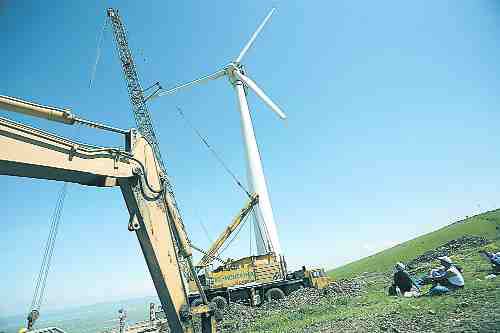

Support for run-of-river projects runs along party lines
By Sam Cooper
The Province
June 7, 2009
NDP fear private power will lead to demise of B.C. Hydro
 The clean-power industry is booming and B.C. is a world leader. Photograph by: Reuters, The Province |
IPPs are private power companies that compete to sell energy to B.C. Hydro. Of 48 IPPs currently operating in the province, most are run-of-river. In the future, wind, solar, geothermal and ocean power are expected to join the IPP mix.
Rather than using the giant river dam/reservoirs traditionally used for power generation, run-of-river technology diverts water with smaller blockages, channeling it through pipes, usually over several kilometres, with steep vertical drops. Rushing water shoots through energy-capture turbines before re-entering the river.
Proponents say these "micro-dam" operations reduce environmental impact -- critical to a provincial Liberal government that has called for more and cleaner power in a push to make the province energy self-sufficient by 2016, while also meeting aggressive targets for greenhouse-gas emission reduction.
The Independent Power Producers Association of B.C. (IPPBC) says it now has 320 member companies, up from 22 in May 2001.
There are currently 580 water-licence applications for rivers across the province by IPPs.
The IPPBC says B.C. Hydro has identified 900 small hydro sites for potential development.
IPPs supply power to 500,000 homes in B.C., contributing about 10 per cent of B.C.'s total system capacity, IPPBC says.
B.C. political parties are starkly divided on IPPs, with the NDP calling for a moratorium on run-of-river operations and the Liberals pushing for increased use.
IPPBC head Steve Davis says that within 10 years the B.C. IPP industry could rival provincial resource giants like forestry or mining for market size.
IPP critics say the projects are not as green as some claim, as wilderness is despoiled and wildlife destroyed with construction of service roads, power lines and water pipes.
NDPers charge IPP promotion is a government ploy to privatize B.C. Hydro. But the Liberals say increased competition from IPPs will keep energy costs down and that environmental assessment standards ensure only the best projects move forward.
Dr. John Nyboer, a Simon Fraser University energy expert, says that as governments around the world face climate change and scarcity of fossil fuels, the "rate of investment in alternative energy is skyrocketing. The last few years in B.C., it's been booming."
But any method of energy production, including run-of-river, has tradeoffs and "pros and cons on all environmental sides," Nyboer says.
© Copyright (c) The Province
Posted by Arthur Caldicott on 09 Jun 2009